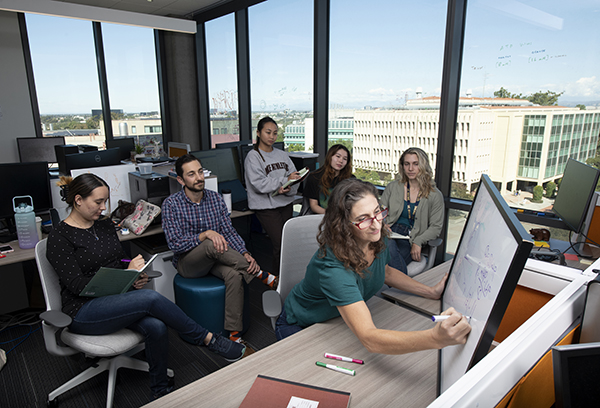Edwards Lifesciences Foundation Supports New Program Focused on Equitable Innovations

Nov. 1, 2023 - The Edwards Lifesciences Foundation has awarded $100,000 to the UCI Samueli School of Engineering to develop a pilot program focused on educating biomedical engineering students about how systemic racism contributes to health inequities. Called the Summer Program in Engineering Equitable Innovations (EQUITI), the eight-week program aims to produce workforce ready engineers who understand how sexism and racism affect healthcare delivery, and how healthcare access and quality depend on local, state and national policy decisions.
Planned for summer 2024, the program will recruit 10 undergraduate students who will attend biweekly seminars taught by faculty in public health and biomedical engineering. Topics addressed include health policy, community-engaged research, engineering approaches to cardiovascular health disparities and the impact of government regulations on those disparities. The students will conduct a mentored research project, then present their findings at a fall workshop.
This EQUITI program is being initiated by Naomi Chesler, professor of biomedical engineering and director of the Edwards Lifesciences Foundation Cardiovascular Innovation and Research Center (CIRC), in conjunction with faculty in the UCI Program in Public Health. Chesler explains that systemic racism has created a public health crisis in this country that requires a new approach to educating biomedical engineers, the future creators of healthcare technologies and innovations.
“I’m just thrilled that Edwards Lifesciences Foundation is supporting this endeavor because it’s transformational,” said Chesler. “We need to train and equip biomedical engineers to create approaches, devices and technologies that not only don’t worsen cardiovascular health disparities in minoritized populations, but help reverse these disparities and are effective for all Americans.”
According to the U.S. Department of Health and Human Services, the conditions in the environments where people are born, live, learn, work, play, worship and age affect a wide range of health, functioning and quality-of-life outcomes and risks. These are called the social determinants of health and they contribute to wide health disparities and inequities. Additionally, technologies with a high price tag can exacerbate health inequities due to differences in income, health literacy, health insurance coverage and capacity of area healthcare providers.
“Design and development of new technologies, devices or models of care should incorporate populations that are often left out of our healthcare system because they could potentially benefit the most,” said Dylan Roby, professor and chair, Department of Health, Society, and Behavior, who is working with Chesler on the summer program. “We think that exposing engineers to coursework in health policy, racism and health, community-engaged research and equity-driven design will help train a new generation of engineers with an appreciation for the impact they could have if they use an equity-based framework to determine which problems to target and what gaps might exist in delivering their new innovative technologies.”
– Lori Brandt
